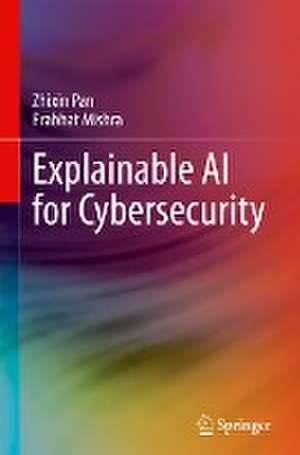Explainable AI for Cybersecurity
Autor Zhixin Pan, Prabhat Mishraen Limba Engleză Hardback – 13 dec 2023
Preț: 706.99 lei
Preț vechi: 883.73 lei
-20% Nou
Puncte Express: 1060
Preț estimativ în valută:
135.30€ • 140.18$ • 112.92£
135.30€ • 140.18$ • 112.92£
Carte tipărită la comandă
Livrare economică 21 martie-04 aprilie
Preluare comenzi: 021 569.72.76
Specificații
ISBN-13: 9783031464782
ISBN-10: 3031464788
Pagini: 243
Ilustrații: XVIII, 243 p. 113 illus., 106 illus. in color.
Dimensiuni: 155 x 235 mm
Greutate: 0.54 kg
Ediția:1st ed. 2023
Editura: Springer Nature Switzerland
Colecția Springer
Locul publicării:Cham, Switzerland
ISBN-10: 3031464788
Pagini: 243
Ilustrații: XVIII, 243 p. 113 illus., 106 illus. in color.
Dimensiuni: 155 x 235 mm
Greutate: 0.54 kg
Ediția:1st ed. 2023
Editura: Springer Nature Switzerland
Colecția Springer
Locul publicării:Cham, Switzerland
Cuprins
Part 1: Introduction.- Chapter 1. Cybersecurity Landscape for Computer Systems.- Chapter 2. Explainable Artificial Intelligence.- Part 2: Detection of Software Vulnerabilities.- Chapter 3. Malware Detection using Explainable AI.- Chapter 4. Spectre and Meltdown Detection using Explainable AI.- Part 3: Detection of Hardware Vulnerabilities.- Chapter 5. Hardware Trojan Detection using Reinforcement Learning.- Chapter 6. Hardware Trojan Detection using Side-Channel Analysis.- Chapter 7. Hardware Trojan Detection using Shapley Ensemble Boosting.- Part 4: Mitigation of AI Vulnerabilities.- Chapter 8. Mitigation of Adversarial Machine Learning.- Chapter 9. AI Trojan Attacks and Countermeasures.- Part 5: Acceleration of Explainable AI.- Chapter 10. Hardware Acceleration of Explainable AI.- Chapter 11. Explainable AI Acceleration using Tensor Processing Units.- Part 6: Conclusion.- Chapter 12. The Future of AI-Enabled Cybersecurity.
Notă biografică
Zhixin Pan is a postdoctoral researcher in the Department of Computer & Information Science & Engineering at the University of Florida. He received his Ph.D. in Computer Science in the Department of Computer & Information Science & Engineering at the University of Florida in 2022. He received his B.E. in the Department of Software Engineering from Huazhong University of Science & Technology, Wuhan, China in 2015. His area of research includes cybersecurity, post-silicon debug, quantum computing, and machine learning. He has published 4 journal articles and 11 conference papers in premier international journals and conferences. His research has been recognized by several awards including the Best Paper Nomination at Asia and South Pacific Design Automation Conference (ASPDAC), 2023.
Prabhat Mishra is a Professor in the Department of Computer and Information Science and Engineering and a UF Research Foundation Professor at the University of Florida. He received his Ph.D. in Computer Science from the University of California at Irvine in 2004. His research interests include embedded and cyber-physical systems, hardware security and trust, computer architecture, energy-aware computing, formal verification, system-on-chip validation, machine learning, and quantum computing. He has published 8 books, 35 book chapters, and more than 200 research articles in premier international journals and conferences. His research has been recognized by several awards including the NSF CAREER Award, IBM Faculty Award, three best paper awards, eleven best paper nominations, and EDAA Outstanding Dissertation Award. He is a Fellow of the Institute of Electrical and Electronics Engineers (IEEE), a Fellow of the American Association for the Advancement of Science (AAAS), and an ACM Distinguished Scientist.
Prabhat Mishra is a Professor in the Department of Computer and Information Science and Engineering and a UF Research Foundation Professor at the University of Florida. He received his Ph.D. in Computer Science from the University of California at Irvine in 2004. His research interests include embedded and cyber-physical systems, hardware security and trust, computer architecture, energy-aware computing, formal verification, system-on-chip validation, machine learning, and quantum computing. He has published 8 books, 35 book chapters, and more than 200 research articles in premier international journals and conferences. His research has been recognized by several awards including the NSF CAREER Award, IBM Faculty Award, three best paper awards, eleven best paper nominations, and EDAA Outstanding Dissertation Award. He is a Fellow of the Institute of Electrical and Electronics Engineers (IEEE), a Fellow of the American Association for the Advancement of Science (AAAS), and an ACM Distinguished Scientist.
Textul de pe ultima copertă
This book provides a comprehensive overview of security vulnerabilities and state-of-the-art countermeasures using explainable artificial intelligence (AI). Specifically, it describes how explainable AI can be effectively used for detection and mitigation of hardware vulnerabilities (e.g., hardware Trojans) as well as software attacks (e.g., malware and ransomware). It provides insights into the security threats towards machine learning models and presents effective countermeasures. It also explores hardware acceleration of explainable AI algorithms. The reader will be able to comprehend a complete picture of cybersecurity challenges and how to detect them using explainable AI. This book serves as a single source of reference for students, researchers, engineers, and practitioners for designing secure and trustworthy systems.
- Introduces a wide variety of software and hardware vulnerabilities;
- Describes solutions for detecting security attacks using explainable AI;
- Presents a fast and robust framework using hardware acceleration and mitigation of adversarial attacks.
Caracteristici
Introduces a wide variety of software and hardware vulnerabilities Describes solutions for detecting security attacks using explainable AI Presents a fast and robust framework using hardware acceleration and mitigation of adversarial attacks
